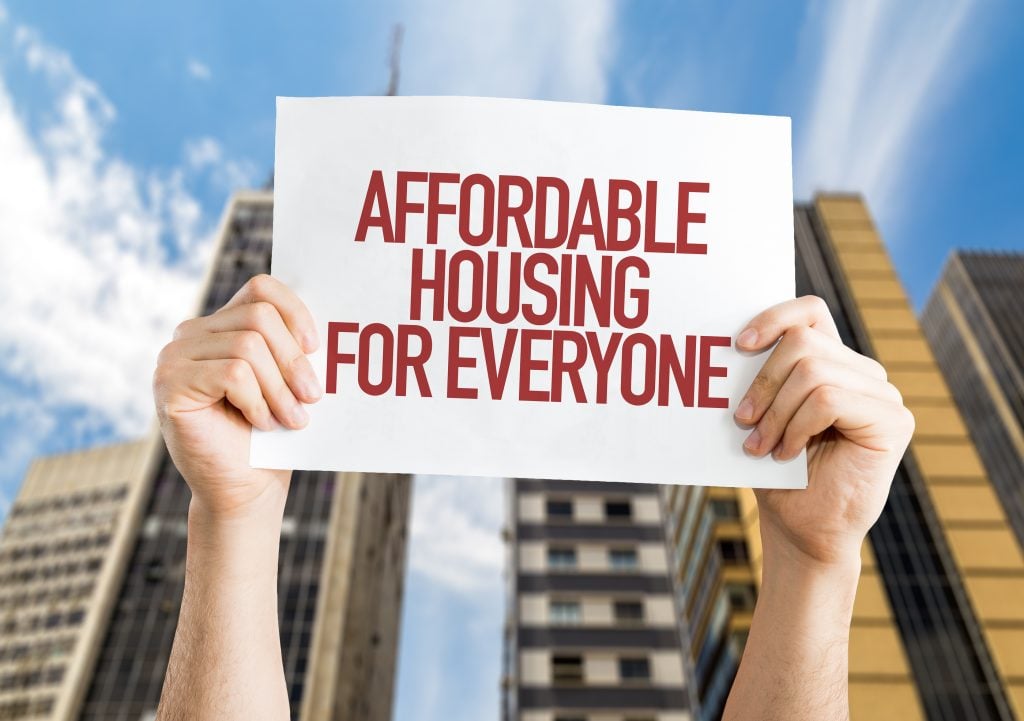The affordable housing crunch doesn’t affect only first time homebuyers. It also affects renters and ultimately the entire economy. The affordability problem was bad in 2019 and became worse in 2020, substantially due to COVID-19. Harvard University’s State of the Nation’s Housing 2020 report (sponsored by Habitat for Humanity), defines “housing cost burdened” as spending 30% or more of their income on housing. In 2019, this was 30.2% of all households nationwide. Housing cost burden data is not yet available for 2020 but the 2109 data marks the eighth straight year that the median sales price of existing single-family homes rose faster than median household income. The 2020 data is expected to show a much greater affordability problem in the homeownership market.

Supply shortages, down payment hurdles, and tighter credit requirements are all root causes. However, major compounding factors also include:
Although 2020 monthly rent costs decreased by 0.6%, renters lost ground because most of the decline happened in the luxury apartment market. Just as important, renters disproportionately faced job losses and fewer hours during the pandemic.
The State of the Nation’s Housing 2020 report points to these major contributing factors for the undersupply of affordable homes:
The shortage of affordable housing undermines a swift economic recovery that always begins in metropolitan areas. This is where lack of affordable housing will prevent economic competitiveness and productivity increases. Merely creating jobs does no good unless there is a sufficient supply of affordable housing for the local workforce.
Unemployed and available workers will first look for jobs in areas with affordable housing that are distant from high cost economic centers. The distance from jobs affects both employees and employers. As workers move farther from their workplace in search of affordable housing, long commutes affect the quality of family life, reduce productivity, and contribute to employee turnover, especially among low and moderate wage workers. Businesses will not be able to attract and retain workers to fill open positions.
Class C housing stock is currently 96% occupied nationally and 99% occupied in the Midwest, according to RealPage (property management software company). Metro areas are desperate for more affordable housing, but the cost for developers is just too high. Land, labor, and materials that were too costly before the pandemic, are even more so now.
The pandemic has also devastated the hotel business that is highly concentrated in the very economic centers that are in desperate need of affordable housing. The percentage of hotels currently behind on their mortgages rose to over 18% in December.
In Minneapolis (the Midwest of the country), apartment units cost about $120,000 each. But in the soft hotel market, units are going for between $30,000 and $40,000. Hotel suites are very easy and inexpensive to convert into small apartments. Standard hotel rooms aren’t that much more expensive to convert at a cost of about $10,000 per unit. This gets around the high development cost that developers say is holding back the development of affordable housing. However, one of the biggest obstacles is zoning restrictions that prohibit high-density residential housing - something that local authorities can easily change.
Other developers are working against this affordable housing possibility. Their goal is tearing down more of the already limited Class C housing to rebuild with higher rent Class A housing. This might make good short-term financial sense but it won’t generate rapid economic recovery in metro areas. In the long-term, Class A housing will suffer because less employment will result in less demand. Less demand means lower rents for more costly properties. Affordable housing makes better long-term economic sense.
Please leave your comment.
Also, our weekly Ask Brian column welcomes questions from readers of all experience levels with residential real estate. Please email your questions, inquiries, or article ideas to [email protected].